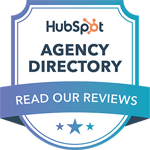
Are you making the most of your social media presence? There’s an endless list of social media platforms these days, so it’s something you constantly need to evaluate to make sure you’re getting the best results. With so many choices for your marketing, it can be difficult to decide where to focus,
but with the right strategy, social media marketing can bring great exposure for your B2B brand.
Is Social Media Important for B2B?
The answer is a resounding: "YES".
According to studies, 84% of C-level and VP-level buyers are influenced by social media when purchasing. Businesses aren’t just faceless entities; they’re made up of real-life humans, and guess where these people spend their time?
Billions and billions of us are on social media every day consuming content, and as much as we’d like to think so, we’re not that good at compartmentalizing our work and personal lives. This means ads we see in our personal time will influence our buying decisions in our professional lives.
Too often, B2B businesses write off social media as a marketing tool for B2C, but it’s not the case. Every social media platform gives B2B businesses the opportunity to reach the right people with the right message, and this shouldn’t be passed up.
1. What About Paid Ads?
A question you might hear about social media marketing is “Are you ready to pay to play?” In other words, do you have to invest in paid advertising to see the benefits?
There are two sides to this answer. One - it is still possible to achieve your social media marketing goals through organic growth. Two - it’s not getting any easier as organic reach has dropped across social media platforms and on Facebook, it’s just over 7%.
This is where a complete approach comes in. For any B2B brands looking to make an immediate impact on social media, they have to be willing to consider paid ads, but at the same time, they should be aiming to grow their organic following.
So the next question becomes, “How do social media ads stack up against other paid ads such as Google?”
Again, there’s no right or wrong response here, it’s about finding the marketing method that works for your business, but social media advertising does offer an excellent conversion rate. The average conversion rate for paid ads on Facebook is 9.21% (10.63% for B2B) versus 4.40% across the Google search network.
What’s behind these high conversion rates for paid ads?
There are lots of elements that go into how social media platforms deliver ads, but one of the most important is the ability to target people with incredible accuracy. These companies have so much information on their users and this allows them to deliver your ads to the people that are going to make purchases.
Of course, Google has similar ways to target certain audiences, but the depth of targeting you can use on social media is a big reason why it forms such an important part of B2B marketing.
2. What Platforms Should I Consider?
All of them.
Think of one of the most basic principles of marketing - reaching people where they’re hanging out. That’s exactly what social media marketing is about because the number of people interacting with these platforms is immense:
- Facebook - 2.74 billion
- YouTube - 2.29 billion
- Instagram - 1.12 billion
- LinkedIn - 740 million
- TikTok - 689 million
- Snapchat - 498 million
- Twitter - 187 million
- SlideShare - 80 million
What’s evident is that there’s a huge group of people to reach, the question is whether they provide an efficient way to reach your target market?
This is where it’s important to understand your audience and match it to the demographics of the social media platforms. Naturally, B2B campaigns tend to be drawn to the more professional-oriented platforms like LinkedIn and SlideShare or Facebook because, well, 2.74 billion people.
These platforms may suit your demographics, but it shouldn’t mean you discount the others. For example, millennials - born between 1981 and 1996 - make up around 35% of the workforce today, so there’s a lot of them out there who are going to be making purchasing decisions.
If you look at the demographics of Instagram, around 52% of its audience are aged 25-44, giving you a good platform to reach this important segment of decision makers.
Even when you take a platform such as TikTok, where 60% of users are aged 16-24 with the vast majority not connected to B2B decision-making, there are other aspects to consider. The first is that these are decision-makers of the future, and the second is that this age group tends to be ahead of the curve when it comes to social media. If you take Facebook’s origins, it largely started out with this age group and grew to be ubiquitous among all age groups.
With such huge audiences, all of these social media platforms offer value, it’s about finding ways to maximize that value.
3. Choosing Your Social Media Platforms
One of the most important things about social media is that you do it with clear goals in mind. If you just do it because it’s something you’re supposed to be doing, then it probably won’t work.
Instead, be deliberate with what you do and make sure you’re maximizing your exposure with the platforms you choose.
Go Where Your Target Audience Hangs Out
Every business will have a different target audience.
If every person involved in the decision-making process for companies who buy your product is aged 60+, then perhaps TikTok and Instagram aren’t your best options.
One of the things to remember though is there’s a much more complicated buyer journey in B2B than B2C. There are multiple decision-makers from different demographics, and the process bounces back and forth between many different stakeholders.
This gives reason to the idea that B2Bs should be making use of all the social media options to make sure they’re reaching everyone in the decision-making process.
When using paid social ads, make sure you’re extremely targeted with what you do so you’re spending your budget on your target audience rather than people who are less likely to buy your products.
Businesses are Humans
It’s easy to over-emphasize the difference between selling B2B and B2C. We like to think that business decisions are all made through logic, whereas personal purchases are more emotion-based. The thing is it’s still humans who are making these decisions and emotion is always going to play a part.
B2B marketing doesn’t have to be plain, boring, and uninventive - it needs to do all the things that appeal to human beings:
- Tell a story
- Show the people behind the brand
- Make use of different content types (remember people love video)
- Answer people’s questions/ help them solve problems
- Be responsive
- Entertain
There’s a reason why platforms such as TikTok are seeing such exponential growth (85% in the US in 2020). They’re giving people (the ones making big purchasing decisions in businesses around the world included) the content and interactions they crave.
All of these platforms give you an opportunity to capitalize on this and grow your business through innovative marketing.
Understand the Customer Journey
B2B companies can become frustrated with social media marketing because it’s hard to show a return on investment.
Rather than people clicking on your links and buying your products there and then, social media tends to be nearer the top of the sales funnel. It’s about the awareness stage of the customer journey, where you’re making people aware of their pain points and putting your brand at the forefront of their minds.
Different social media platforms allow you to do this in different ways. You may find that Instagram gives you the tools to do this in a way that Facebook and LinkedIn don’t, but you won’t know unless you explore the different options.
Let the Numbers Guide You
Whichever social media platforms you choose to use, you’ve got to be able to show progress. All of these platforms give you an incredible amount of data, so let the numbers guide you.
If you’re not tweaking what you’re doing and exploring new possibilities, then it’s difficult to maximize your marketing. This might mean testing the waters with different platforms and seeing what’s out there.
If you run a small advertising campaign and see potential, then you may have just found a way to reach an important new segment of your audience.
Make sure you’re not allowing your social media marketing to drift by keeping a close eye on your analytics.
4. Takeaways
If you take a very static approach to social media marketing then you risk getting left behind. This is an industry that’s constantly developing and your strategy should reflect this.
Where there are large audiences there are opportunities for B2B marketers, and every social media platform has potential. You’re investing in creating amazing brand content, so it makes sense to maximize its reach by making the most of all available channels.
Social media platforms are very good at providing you with the tools to reach a very specific target audience, so make sure you’re making the most of these capabilities. Really focus on defining your ideal customers, and then use the sophisticated targeting options to provide them with relevant, high-quality content.
The key strength of these platforms is the detailed information they have on their users, so ensure you’re using it to your advantage. With strong returns on ad spend, it’s well worth exploring these options and testing your ads on different platforms.
Social media offers a lot of opportunities for B2B businesses, so don’t write off certain platforms as the domain of B2C marketers.
Looking for some guidance from experienced SEO, Social Media and Content Marketing professionals?
Then why not contact our Social Marketing experts today!





